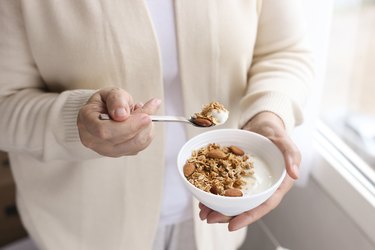
When you think of weight-loss foods, nuts may not be the first to come to mind. After all, they're relatively high in fat and calories per serving. But for a variety of reasons, adding nuts to your diet may make it easier to shed pounds.
Case in point: A September 2019 study published in BMJ Nutrition, Prevention & Health found that eating nuts regularly may actually help prevent us from gaining weight over the years and decrease our risk of having obesity.
Video of the Day
Video of the Day
What's interesting is that the researchers saw this effect when people ate just a half serving (half an ounce) of nuts per day — equal to 24 pistachios, 12 almonds or seven walnut halves. The bad news? The results didn't hold true for peanut butter.
Here's four more reasons why nuts are great for your waistline, and why you'll want to make sure they're part of your weight-loss plan.
Read more: 9 Healthy Nuts That May Help You Live Longer
1. They Can Replace Less-Healthy Foods
In general, we know that if you're filling up on foods like whole grains, fruits, vegetables, nuts and lean proteins, it doesn't leave much room for unhealthy choices like ultra-processed foods that are filled with refined grains, added sugars and saturated fats.
And indeed, in the September 2019 BMJ study, researchers found that people who swapped processed meats, refined grains or desserts for a half serving of nuts were less likely to gain weight over a four-year period. This is important when you consider that U.S. adults gain an average of a pound per year after the age of 30.
2. Nuts Make You Eat More Slowly
Another theory from the researchers of this study is that nuts require a lot of chewing, or "considerable oral processing effort" — so much so that you'll have less time, energy or appetite to eat more food.
While this might not sound like it would amount to much, research shows that those who eat more quickly usually end up weighing more. A November 2015 meta-analysis published in the International Journal of Obesity, for example, found a positive association between eating rate and body weight. So nuts aside, it's best to slow down and chew your food.
3. Your Body Doesn't Absorb All of the Calories in Nuts
Nuts have a tough, fibrous structure — so tough, in fact, that our bodies don't fully break them down during digestion.
How do we know? Two 2012 studies, one published January in the British Journal of Nutrition and the other in the American Journal of Clinical Nutrition in August, followed the full digestion of pistachios and almonds, respectively, from start to finish. Researchers found that the amount of metabolizable energy we glean from these foods is actually 5 percent less for pistachios and 32 percent less for almonds than we previously thought.
4. Nuts Keep You Full
All nuts are a source of fiber and fat, and both of these nutrients have been shown to promote satiety, aka a feeling of fullness.
A November 2013 study published in the European Journal of Clinical Nutrition found that snacking on almonds reduced the rise in glucose we typically see after eating a meal. When blood sugars rise and fall quickly, that can mess with your energy and appetite, leaving you feeling hungry even after you've eaten. Eating almonds, though, seems to reduce overall hunger and the desire to eat.
- BMJ Nutrition, Prevention & Health: "Changes in Nut Consumption Influence Long-Term Weight Change in US Men and Women"
- International Journal of Obesity: "Association Between Eating Rate and Obesity: A Systematic Review and Meta-Analysis."
- British Journal of Nutrition: "Measured Energy Value of Pistachios in the Human Diet."
- American Journal of Clinical Nutrition: "Discrepancy Between the Atwater Factor Predicted and Empirically Measured Energy Values of Almonds in Human Diets."
- Journal of the American College of Nutrition: "The Effect of Fiber on Satiety and Food Intake: A Systematic Review."
- American Journal of Clinical Nutrition: "Effect of Fat Saturation on Satiety, Hormone Release, and Food Intake."
Was this article helpful?
150 Characters Max
0/150
Thank you for sharing!
Thank you for your feedback!